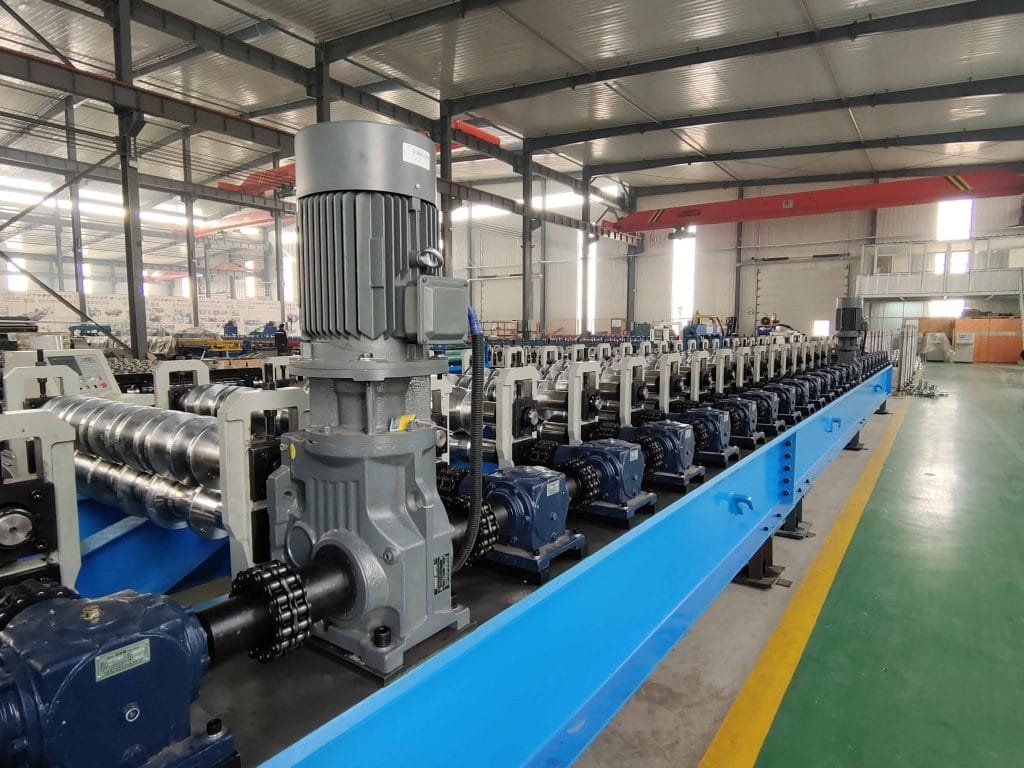When comparing our two types of roofing sheet making machine—Gear Box Transmission Roofing Sheet Making Machine and Chain Transmission Roofing Sheet Making Machine—it’s important to understand the factors that affect pricing and performance differences between the two.
Gear Box Transmission Roofing Sheet Making Machine

This advanced model features higher performance and efficiency, making it ideal for businesses looking to scale production. The machine operates at a faster stamping and cutting speed of 6 to 8 meters per minute. It is powered by a robust gearbox transmission system and is supported by a casting pillar for enhanced durability. The full production line includes a control cabinet, hydraulic pump station, and a forming machine, all designed for seamless operation. This system offers superior performance, reduced maintenance, and longer lifespan, making it a worthwhile investment for businesses aiming to increase productivity.
Chain Transmission Roofing Sheet Making Machine

In contrast, the Chain Transmission Roof Tile Machine is a more traditional and cost-effective option. It offers a slower production speed, ranging from 1 to 3 meters per minute, which makes it more suitable for smaller operations or businesses with lower production requirements. Despite being more affordable, it still provides reliable results, with a hydraulic decolor coupling for efficient operation. However, the slower stamping and cutting speeds, as well as the overall performance, make it less ideal for high-demand environments.
Key Differences
Production Speed: The Gear Box Transmission model is nearly twice as fast as the Chain Transmission machine, offering 6 to 8 meters per minute versus 1 to 3 meters per minute. This makes the gearbox-driven machine better suited for high-volume production.
Performance & Efficiency: The Gear Box Transmission system offers better efficiency and faster delivery of products, significantly reducing time-to-market. In contrast, the Chain Transmission system may require more time to achieve the same output.
Machine Design: The Gear Box model includes a casting pillar for added strength and stability. Its design is more suited for high-performance, heavy-duty tasks, while the Chain Transmission model uses traditional components, making it more economical but less efficient for large-scale production.
Cost Considerations: Although the Gear Box Transmission Roof Tile Machine comes at a higher initial price, its performance can justify the cost. In fact, investing in one Gear Box machine could potentially replace two Chain Transmission units, delivering better value over time. The investment in the newer generation machine offers long-term productivity benefits that may help businesses expand their capacity, produce a greater variety of tiles, and meet customer demands faster.
Conclusion
If you are looking to expand your roofing sheet making machine capacity, reduce operational time, and increase overall productivity, upgrading to a Gear Box Transmission Roof Tile Machine could be a strategic decision. While it may seem like a more significant upfront investment, the benefits—such as faster speeds, higher productivity, and better durability—will ultimately lead to a better return on investment. On the other hand, if you are operating on a tighter budget and need a machine for smaller-scale operations, the Chain Transmission Roof Tile Machine remains a reliable, cost-effective solution.
Ultimately, the right choice depends on your specific production needs, budget, and long-term business goals.